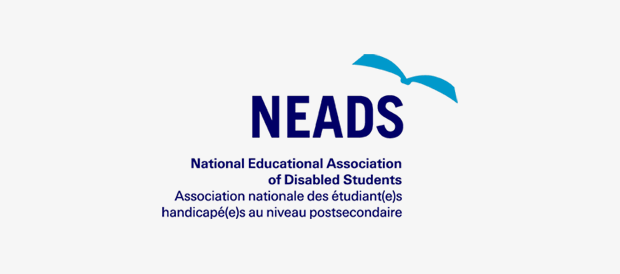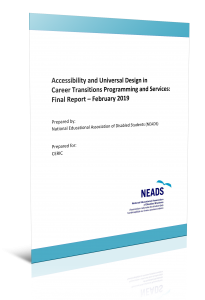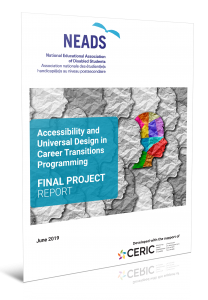
- National Educational Association of Disabled Students (NEADS) released A Mental Health Snapshot of the 2016 Canadian Graduate and Professional Student Survey (CGPSS) Data report on May 31, 2019
- Accommodating students with disabilities on campus: moving beyond silos featured on University Affairs on November 21, 2018
- National Educational Association of Disabled Students (NEADS) released The Landscape of Accessibility and Accommodation for Post-Secondary Students with Disabilities in Canada report on October 1, 2018
- Comparison of Full-time and Part-time Graduate Students with Disabilities using 2016 CGPSS Data
- Comparison of Graduate Students with Disabilities in STEM and Non-STEM Disciplines using 2016 CGPSS Data
- A Snapshot of the Experiences of Graduate Students with Disabilities who Identify as Aboriginal
Learning within the co-curricular environment, including student learning in the context of career transitions, is increasingly recognized as a crucial component of the post-secondary student experience. However, for students with disabilities, the potential for significant barriers exists. For instance, disability services centres on Canadian college and university campuses are typically funded to provide academic accommodations, but not accommodations in other learning environments, and do not often have the staff resources to devote to working with other student services portfolios, such as career educators, in preparing them to work with students with disabilities.
The National Educational Association of Disabled Students (NEADS) will carry out a nationwide research initiative in order to understand the current best practices around accessibility, accommodation and universal design in career education of post-secondary students with disabilities, as well as the gaps in service delivery and professional development that may exist for career educators working with this population. This project is unique for its focus on accessibility and universal design in the career education/career transition space.
NEADS has been a national and international leader in higher education policy and practice research as it relates to students with disabilities over the past decade. The project is led by Dr Mahadeo Sukhai, Director of Research at NEADS, a cross-disability charitable organization with a mandate that includes supporting full access to education and employment for post-secondary students and graduates with disabilities across Canada. Dr Sukhai is also currently the Head of Research and Chief Accessibility Officer at the Canadian National Institute for the Blind (CNIB).
This project comes under the umbrella of the larger NEADS “Landscape of Accessibility and Accommodation for Students with Disabilities in Canadian Postsecondary Education (2016-2018)” initiative funded by the Government of Canada. The new research will undertake online and in-person consultations with students with disabilities and career educators. Collaborating institutions include the University of Toronto, BC’s Simon Fraser University, Memorial University of Newfoundland and Manitoba’s Assiniboine College. This project will also leverage existing Canada-wide student datasets, including the Canadian Graduate and Professional Student Survey (CGPSS), the National Survey on Student Engagement (NSSE) and the Community College Survey on Student Engagement (CCSSE), in order to obtain a more global overview of the experiences of students with disabilities in campus-based career education.


Objectives and Activities
The objective of the new research is: To define best practices and “fillable gaps” in policy, practice and professional development requirements as they relate to accessibility and universal design in working with students with disabilities in the career education/career transition space within Canadian post-secondary education.
Key activities include:
- Examining large national student engagement/student experience survey datasets for relevant data related to career transitions in the context of disability
- Conducting a nationwide survey of career education professionals in order to understand their experiences working with students with disabilities
- Conducting focus groups and key informant interviews to understand the narrative around engagement of students with disabilities in career transition programming
- Understanding gaps in student need through a nationwide survey of students with disabilities
- Data synthesis, development of research report and recommendations
- Dissemination of interim and final project findings through academic publication, conference presentations, and sharing within NEADS’ partnership network
After the conclusion of the project, it is anticipated that a number of NEADS’ established partners – including the Council of Ontario Universities, the Canadian Association of Graduate Studies, the Canadian Association of Career Educators and Employers, and the Canadian National Institute for the Blind, as well as career centres on post-secondary campuses across Canada – will begin to work with the project deliverables in order to better shape their own programming, resources and services for students with disabilities.
This research will occur at the same time as, and is expected to inform, the Government of Canada’s consultation on a new federal disability act. Consultations and research on post-secondary access and services are timely and will contribute to the Government of Canada’s emphasis on access to education and training for persons with disabilities, leading to their participation in the competitive labour market.
